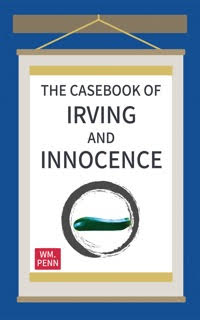October 2, 2015
Interview: Kathy Morikawa
Kathleen Morikawa, aka Wm. (Wilhelmina) Penn, is the author of The Casebook of Irving and Innocence: The Complete Trilogy. Originally published as three separate ebooks—Thursdays in Yokohama, Fridays in Kamakura, and Saturdays in Sapporo —the complete trilogy was released in paperback and ebook form on Amazon this spring. The ebook version also will be available from Nook, iTunes, Kobo, and Tolino in mid-October.
You’ve been a member of SWET since way back and in fact have been living in Japan since 1973. What brought you here first?
Yes, I was among the crowd of more than 100 at the first SWET meeting at Barbara Adachi’s house way back in 1980. I came to Japan in the autumn of 1973 to enter the M.A. program in East Asian Studies (Japanese Art History) at Sophia University. That’s the short, simple answer. The rest of the story is detailed in The Casebook, which I suppose you could call a fictional memoir or autobiographical fiction. It’s a humorous summing up of sorts. The title characters Innocence, a twenty-something newcomer to Japan, and Irving, who has lived on the archipelago for over forty years, are fictional creations; but many of the “cases” they discuss borrow liberally from my own life experiences.

So then you became a columnist, writing regular columns in the Daily Yomiuri and Asahi Evening News that continued for years. Was that professionally satisfying as well as financially rewarding enough to keep you going?
Well, until 1988, I taught English at several universities. To have continued my career in English teaching probably would have been more lucrative, but I’ve never wanted to do anything else but write. So, yes, it was very satisfying to be able to write on a regular basis. The Asahi Evening News media-watching column Weekly Watch appeared under my real name for thirteen years from 1991–2004. As Wm. Penn, I wrote Televiews for the Daily Yomiuri for a quarter century from 1987 to 2012. Then, the Yomiuri and I parted ways over an issue I considered censorship and they saw as editorial discretion. I’ve written about that on my blog in a piece called “Penn Sans Paper.”
Your name is familiar as one of the feisty ones who refused to be fingerprinted, back in the 1980s, and there were arrests, court cases, and lots of trouble. What did you win from that experience? Have you written about that?
What I won from that experience, which spanned most of the 1980s, was an exceptional education in how the system works in Japan—the police, prosecutors, courts, government, bureaucrats, and the media. That probably gave me the understanding and background necessary to launch a career as a columnist.
I wrote a 13-part series about the experience for the Mainichi Daily News back in 1986–1987 and a retrospective piece for the Japan Times in 2007 when the government was about to reintroduce fingerprinting. What can be learned also is that things can change. Fingerprinting did eventually end in 1999, but hard-won victories have to be protected with constant vigilance. Otherwise, they can slip away again, just as this victory did when fingerprinting was reintroduced in a new form in 2007.
You wrote that The Casebook “ended up being a way of writing a version of a story I’ve been working on for 50 years.” What did you mean by that?
Well, I had been trying to write my father’s story for 50 years—as a short story, a play, a script, and a straightforward memoir—but could just never get it right. Meanwhile, in the first two books of this trilogy, I specifically made Irving a man of mystery, choosing not to delve into his background or burden him with expat stereotypes.
When I got to book three, the idea of working my father’s story into The Casebook format came to me. While considering whether to do it or not, Thursdays in Yokohama received a rather critical Amazon three-star review: “Some cute little stories, but what I really wanted to know is why Irving went to Japan, why he stayed, and what he does.” I had to agree the reader was right. Irving needed a past to share, and so the story I’d been trying to write for five decades became Irving’s back story. Ironically, several people, who had persevered and read through all the other failed attempts to tell that tale, said that it finally worked for them in this format. One just never knows, as Irving would say.
Who is the inspiration for “Irving”? Or is that a secret?
Irving is an original character. He does resemble me in many ways but, perhaps, other long-term residents will recognize glimpses of themselves in the irrepressible Irving, too.
Kathleen Morikawa has been self-publishing books under the Forest River Press imprint since 2003. She is the author of Who Changed the Channel? Sixty Years of Japanese TV (an updated version of The Couch Potato’s Guide to Japan), and the children’s book Hana the Bilingual Beagle. She can be contacted via her website: http://www.forestriverpress.com. Her 2006 book, Self-Publishing in Japan: What You Need to Know to Get Started, is now out of print, but she will be writing about what is involved in getting into the digital self-publishing game from Japan for SWET soon.
